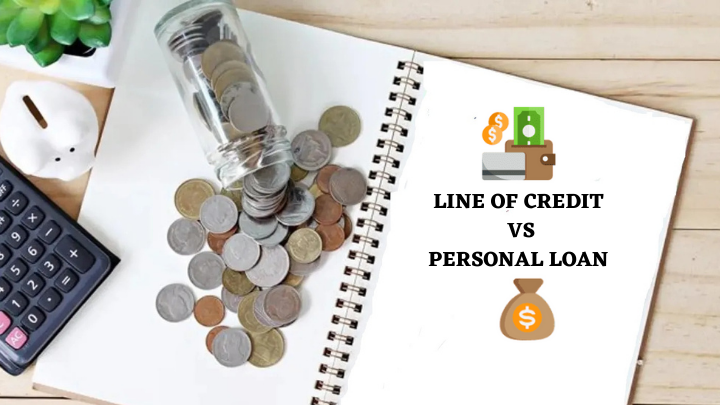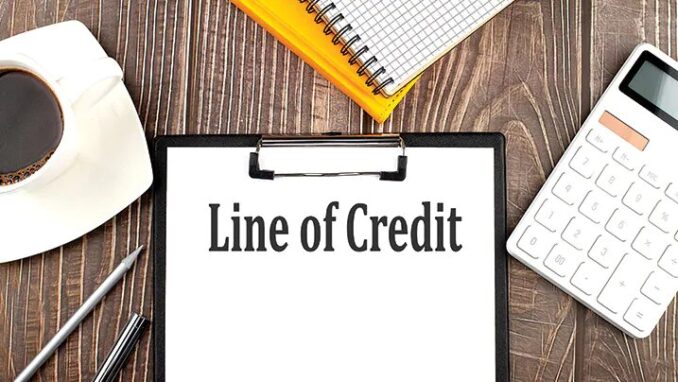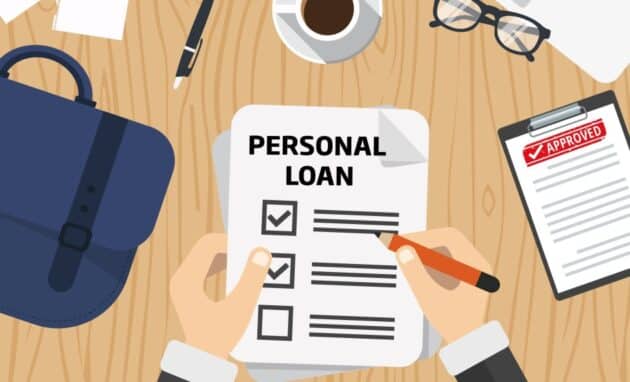Difference Between A Line Of Credit And A Personal Loan?
Posted on: April 13, 2022 | Category: Business Credit

At some point in life, people need to borrow money to finance any major task in life. Perhaps you require funds to purchase a property or to cover an unforeseen medical expenditure. You might even choose to take a debt consolidation by taking out a loan with a reduced rate of interest.
Both a personal loan or a line of credit, depending on the situation, may be able to assist in achieving such objectives. Both methods of finance provide access to capital, but they operate in quite different ways. A personal loan varies from a personal line of credit in that you borrow the same payment amount and return it over a certain period of time with a predetermined payment amount.
When compared to lines of credit, personal loans are trouble-free to budget for. Personal line of credit, on the other hand, can provide flexibility when it comes to borrowing. Line of credit gives the ability to to borrow up to the limit of the credit, pay it back within the repayment period, and borrow again as needed. Based on the objective behind borrowing money, both the options have their own pros and cons. When analysing line of credit vs personal loan, the biggest differentiating factor between the two is the terms of each of them. Understanding the distinctions between these two financial products will help you make an informed and prudent choice.
Line of Credit – The Basics

Personal lines of credit is an unsecured revolving credit line, similar to a credit card. It has a limit to the credit as well as a variable interest rate. If you’re attempting to budget and aren’t sure how much something will cost, a personal line of credit could be a good option. It’s important to remember that rates of interest in line of credit are often variable. Indeed, this makes it difficult to forecast how much money you’ll end up owing. While variable interest rates may cause your payments on a personal line of credit to fluctuate, the interest you pay is only on the portion of the credit line that you use. Many local banks and online lenders offer lucrative lines of credit.
Generally, personal lines of credit aren’t meant to be used to cover one-time purchases like houses or cars. But one can use them to buy items that a bank may not ordinarily underwrite a loan for. Line of credit is best to smooth out the peaks and valleys when you come across unprecedented monthly expenses and income, or to fund projects when you cannot possibly predict the exact funding requirements in advance. This credit option is ideal for:
1. Unforeseen emergency circumstances
2. Providing a cushion for irregular incomes
3. Protection against overdrafts
4. House renovation projects
In cases where there will be frequent cash outlays, personal lines of credit can be beneficial. However, in instances requiring substantial cash payments, the amounts may not be known in advance and/or the sellers may not accept credit cards.
Personal Loan – The Basics

Personal loans are a sort of loan that provides you with a certain amount of money in one lump sum. They’re typically used for one-time purchases. Because these loans have fixed interest rates and payback schedules, your fixed monthly payments will be the same each month. A personal loan might be obtained via a local bank, credit union, or online lender. Personal loan can prove to be beneficial in following cases:
1. For wedding expenditure
2. Paying down student or college loans
3. Taking a loan for a large purchase
4. Paying off credit card debt
Personal loans are short-term loans that you can use to pay for a variety of personal expenses. These can be secured, in which case you must put up security to borrow money. Also, such loans can be of unsecured, type in which case you do not need to put up any collateral. When it comes to rates of interest, fees, amounts, and payback durations, these loans might be very different. These loans have another name – signature loans. They acquire this name from the fact that if you meet the criteria, you can get a loan with just your signature.
Common Elements Of Personal Loan And Lines Of Credit:
1. Applying for both of them necessitates a hard credit score check. Thus, it may have an impact on the credit score.
2. Both the options require interest payments.
3. The basic requirements or eligibility criteria for both of them are generally the same.
4. More or less both personal loans and personal line of credit are unsecured. Henceforth, they are a little less risky.
Biggest Dissimilarities Between Lines Of Credit And Personal Loans:
1. Lines of credit have higher rates of interest in comparison to most personal loans. This is because personal lines of credit involve a bigger risk on the part of the lender.
2. The interest rate of lines of credit is variable. Whereas, that of personal loan is fixed.
3. Loan or fund disbursement is the biggest difference between personal loan and lines of credit. Personal loan provides access to the full money upfront in a single go. Whereas, in the case of a personal line of credit, you can access the money just like a credit card with a ‘revolving’ credit line.
How To Assess Which Option Is Ideal For You?
Choosing between personal loan and personal lines of credit requires consideration of various factors and requirements. Therefore, which would be the optimal option varies per individual. When it comes to deciding between a personal loan and a personal line of credit, the best option relies on your financial situation and what you want to do with the money. Consider a personal loan if you know exactly how much you need to borrow for your expense or project and want monthly payments that are predictable. A personal line of credit, on the other hand, may be a better option if you desire more flexibility and aren’t sure how much money you’ll need in total.
1. Assess the level of need of money and the amount of money as per your situation demands.
2. Thoroughly scan the benefits and drawbacks of each debt option with respect to your present and future requirements.
A line of credit could be a good option if you’re not sure how much money you’ll need to borrow. It’s great for long-term or ongoing expenses like an unpredictably large home repair job. You only pay interest on the percentage of your credit limit that you actually use, just as with a credit card. Line of credit have fluctuating rates of interest, so keep that in mind. This implies that the monthly payment, as well as the total interest rates that may incur, will vary.
Alternatively, personal loans have a set rate of interest that do not alter throughout the course of the loan. This helps in better management of the funds, as you know exactly how much money you need to pay per month. Personal loans are appropriate for major, one-time expenses because the cash is distributed in one lump payment.
Conclusion:
The crux is that if you can find out which financial product best suits your needs, you may be able to save money while also avoiding unnecessary hassles. If you take out a personal loan that is insufficient to pay the expenditures of a large project, you may have to borrow again. This implies you’ll have to fill out another application and risk harming your credit score as a result of the additional account and inquiry. If you take up a line of credit when you don’t truly need it, alternatively, you may be charged higher interest rates than you could have gotten with a personal loan.
Before deciding which loan product to apply for and which lender to utilise, do your homework. This also includes a credit history check. You may be confident that you’re getting the best bargain if you take the time and don’t rush into a decision.







